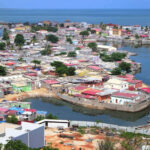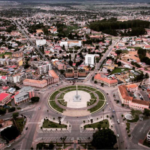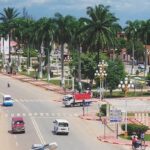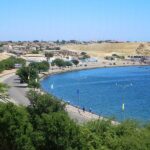Benguela
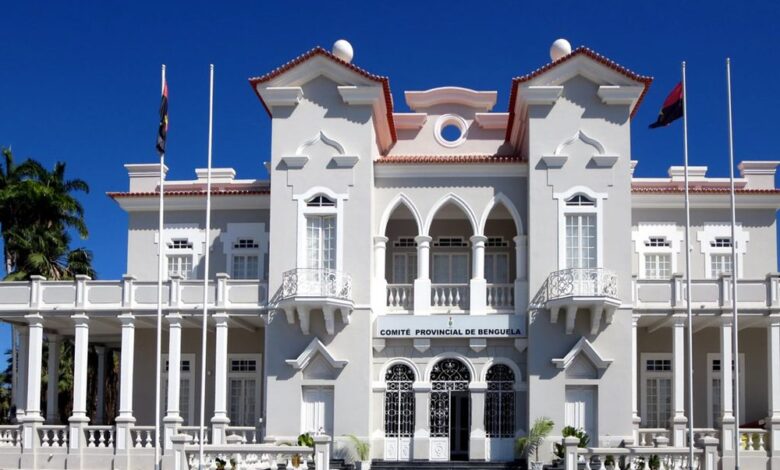
Benguela, pronounced as [bẽˈɡɛlɐ] in Portuguese and known as Luombaka in Umbundu, is a captivating city nestled in western Angola. It serves as the capital of Benguela Province and boasts a rich history and vibrant culture. In this article, we will take you on a journey through the past and present of this remarkable city, highlighting its significance, growth, and unique attributes.
History
Portuguese Rule
Benguela’s roots date back to 1617 when it was established as São Felipe de Benguela by the Portuguese, under the leadership of Manuel Cerveira Pereira, who served as the 8th Governor of Angola from 1604 to 1607. During this era, Benguela held a pivotal role in the global trade network, especially in the transportation of slaves to Brazil and Cuba. Ships from distant lands would anchor offshore, and their cargo was transferred to smaller boats through a network of jetties in the town. However, a neighboring deep-water harbor in Lobito overshadowed Benguela’s importance.
Apart from its role in the slave trade, Benguela boasted the churches of S. Felipe and S. António, a hospital, and a fortress. By 1911, it had only a few stone-built houses. Just a short distance away was Baía Farta, known for salt production and sulfur extraction, while Baia Azul offered a picturesque beach. Despite modest beginnings, the city experienced steady growth and prosperity in the ensuing decades.
One of the most significant developments in this period was the construction of the Benguela Railway. This project, initiated in the early 20th century by Portugal, aimed to connect Benguela and Lobito to the interior, culminating in success when linked to the Copperbelt of Katanga in the DR Congo and Zambia.
The early 20th century also saw Benguela attract quality businesses and professionals, fostering economic growth in the city. Industries like sisal production and fishing expanded, and the financial, construction, and service sectors flourished until 1974.
Post-Independence
In 1975, following the Carnation Revolution in Lisbon, Portugal, Angola gained independence. However, the post-independence era was marked by the Angolan Civil War, which persisted for more than two decades. This conflict led to the closure of most of the Benguela railway line, with only a short 30-kilometer stretch remaining operational, connecting Benguela to Lobito. During the war, the city experienced an influx of refugees from rural areas, further altering its demographics.
21st Century
The mid-2000s brought a more peaceful environment to Benguela, and restoration work on the railway between Benguela and Huambo began. While the colonial part of the city still retains good-quality houses, most refugees from the civil war now reside in slum areas, marking a stark contrast.
Transports
Benguela is well-connected with an airport, the Benguela Airport, and the Benguela Railway, which offers transportation links to various destinations.
Economy
Historically, Benguela played a crucial role in Portuguese trade with the African interior. Today, it continues to be an important commercial link between western and eastern Angola. The city’s economy thrives on the cultivation and trade of products like coffee, corn, sisal, sugarcane, and tobacco from the interior regions of Angola. Manganese, another valuable resource, is also traded here. Industries in Benguela include fish processing, sugarcane milling, pottery, soap production, and tool manufacturing. Foreign trade is facilitated through the deep-water port of Lobito, located just 29 kilometers north of Benguela. This port, once disrupted during the Angolan Civil War, has since revived and plays a pivotal role in supporting trade in the Benguela region.
Education
Benguela is home to the Universidade Katyavala Bwila and Ruvandro Ferreira, founded in 2009, which contributes to the city’s educational landscape.
Culture
Religion
Benguela hosts a diverse religious landscape with predominantly Christian churches and temples. Some of the notable places of worship include the Roman Catholic Diocese of Benguela (Catholic Church), Evangelical Congregational Church in Angola (World Communion of Reformed Churches), Evangelical Reformed Church in Angola (World Communion of Reformed Churches), Baptist Convention of Angola (Baptist World Alliance), Universal Church of the Kingdom of God, and Assemblies of God.
Notable Residents
Benguela has been home to several remarkable individuals, including:
- Maria Araújo Kahn, an associate judge on the Connecticut Supreme Court.
- Leila Lopes, who was crowned Miss Angola in 2010 and went on to become Miss Universe in 2011.
- Matias Damásio, a talented musician.
- Luís Sá Silva, a racing driver.
Conclusion
Benguela, with its captivating history, cultural diversity, and economic significance, remains a city of immense importance in Angola. From its colonial past to its post-independence challenges and contemporary revival, Benguela’s story is one of resilience and adaptability.
For those interested in exploring this historic city further, Benguela offers a unique blend of experiences and opportunities. So, come and discover the beauty and history of Benguela for yourself.
FAQs
- What is the historical significance of Benguela in Angola? Benguela played a crucial role in the historical slave trade and was a center for Portuguese trade with the African interior.
- How did the Angolan Civil War impact Benguela? The civil war led to the closure of most of the Benguela railway, and the city saw an influx of refugees from rural areas.
- What are the major industries in Benguela today? Benguela’s economy thrives on agriculture, including coffee, corn, sugarcane, and tobacco, as well as manganese trade and various manufacturing sectors.
- What transportation options are available in Benguela? The city has an airport, the Benguela Airport, and is connected to the railway network through the Benguela Railway.
- Who are some notable residents of Benguela? Notable residents include Maria Araújo Kahn, Leila Lopes, Matias Damásio, and Luís Sá Silva.
